Chhatrapati Shivaji Maharaj International Airport
Chhatrapati Shivaji Maharaj International Airport, Mumbai (IATA: BOM, ICAO: VABB) is the primary international airport serving the Mumbai Metropolitan Area, India. It is the second busiest airport in the country in terms of total and international passenger traffic after Delhi, and was the 14th busiest airport in Asia and 28th busiest airport in the world by passenger traffic in calendar year 2017.[4] Its passenger traffic was about 49.8 million in year 2018. The airport is the second busiest in the country in terms of cargo traffic also. In March 2017, the airport overtook London Gatwick Airport as the world's busiest airport with only one operational runway at a time.[5]
Chhatrapati Shivaji Maharaj International Airport | |||||||||||||||
|---|---|---|---|---|---|---|---|---|---|---|---|---|---|---|---|
 | |||||||||||||||
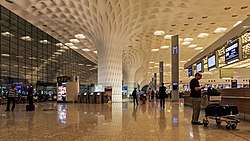 | |||||||||||||||
| |||||||||||||||
| Summary | |||||||||||||||
| Airport type | Public | ||||||||||||||
| Operator | Mumbai International Airport Limited (MIAL) | ||||||||||||||
| Serves | Mumbai Metropolitan Region | ||||||||||||||
| Location | Mumbai, Maharashtra, India | ||||||||||||||
| Opened | 1942 | ||||||||||||||
| Hub for |
| ||||||||||||||
| Focus city for |
| ||||||||||||||
| Elevation AMSL | 11 m / 37 ft | ||||||||||||||
| Coordinates | 19°05′19″N 72°52′05″E | ||||||||||||||
| Website | www | ||||||||||||||
| Map | |||||||||||||||
 BOM  BOM 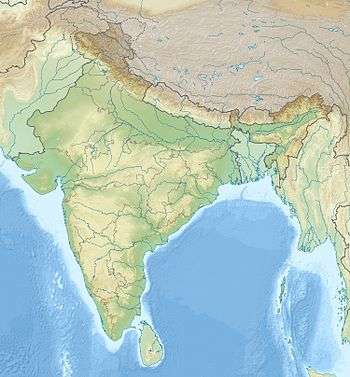 BOM 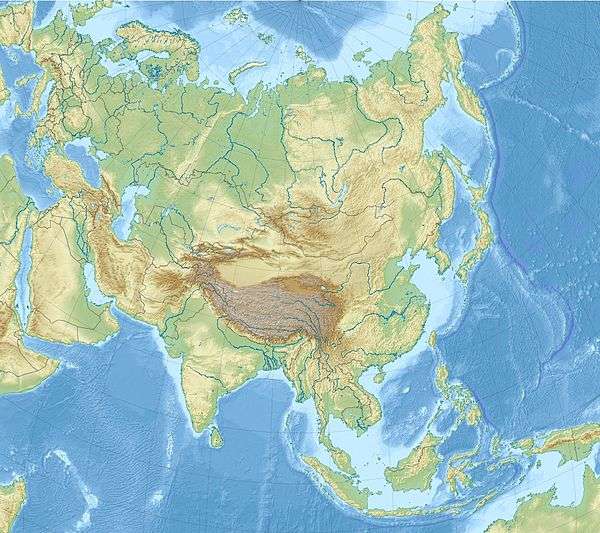 BOM 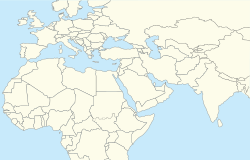 BOM | |||||||||||||||
| Runways | |||||||||||||||
| |||||||||||||||
| Statistics (2018) | |||||||||||||||
| |||||||||||||||
The airport has three operating terminals spread over a total land area of 750 hectares (1,850 acres)[6] and handles about 950 aircraft movements per day. It handled a record 1,007 aircraft movements on 9 December 2018, higher than its earlier record of 1,003 flight movements in a day in June 2018. It handled a record 51 movements in one hour on 16 September 2014.[7] Along with IGI Delhi, it was adjudged the "World's Best Airport" at Airport Service Quality Awards 2017 in the highest category of airports handling more than 40 million passengers annually by Airports Council International.[8] It has also won the "Best Airport in India and Central Asia" award at the Skytrax 2016 World Airport Awards.[9] It is one of the three airports in India to have implemented Airport Collaborative Decision Making (A-CDM) to ensure timely takeoffs and landings.[10]
The airport is operated by Mumbai International Airport Limited (MIAL), a Joint Venture between the Airports Authority of India and the GVK Industries Ltd led consortium[11] which was appointed in February 2006 to carry out the modernisation of the Airport.[12] The new integrated terminal T2 was inaugurated on 10 January 2014[13] and opened for international operations on 12 February 2014.[14] A dedicated six lane, elevated road connecting the new terminal with the main arterial Western Express Highway[15] was also opened to the public the same day.[16]
The airport is named after the 17th-century Maratha king Chhatrapati Shivaji, having been renamed in 1999 from the previous "Sahar Airport" to "Chhatrapati Shivaji International Airport" (the title "Maharaj" was inserted on 30 August 2018[17]). CSIA's IATA airport code – "BOM" – is derived from Bombay, Mumbai's former name. It is situated across the suburbs of Santacruz and Sahar village in Vile Parle East.
History
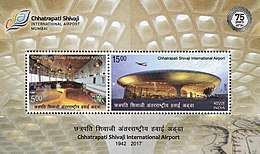
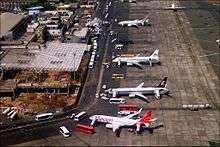
RAF Santacruz was constructed in the 1930s.[18] It was a bigger airfield than nearby Juhu Aerodrome and was home to several RAF squadrons during World War II from 1942 to 1947.[19] The Airport covered an area of about 1,500 acres (610 ha) and initially had three runways.[20] The apron existed on the south side of runway 09/27, and the area, referred to today as the "Old Airport", houses, among others, maintenance hangars of Air India, Air Works India, Indamer Aviation Pvt Ltd. and MIAL's General Aviation Terminal.
By 1946, when the RAF began the process of handing over the airfield to the Director General of Civil Aviation for Civil operations,[21] two old abandoned hangars of the Royal Air Force had been converted into a terminal for passenger traffic. One hangar was used as a domestic terminal and the other for international traffic. It had counters for customs and immigration checks on either side and a lounge in the center. Air India handled its passengers in its own terminal adjoining the two hangars.[20] In its first year, it handled six civilian services a day.
Traffic at the airport increased after Karachi was partitioned to Pakistan and as many as 40 daily domestic and foreign services operated by 1949, prompting the Indian Government to develop the airport, equipping the airport with a night landing system comprising a Radio range and a modernised flare path lighting system[22] Construction of a new passenger terminal and apron began in 1950 and was commissioned in 1958.[20] Named after the neighbourhood in which it stood and initially under the aegis of the Public Works Department, the new airport was subsequently run by the Ministry of Civil Aviation.
With the dawning of the Jumbo Jet era in the 1970s, Santacruz, despite several extensions, began suffering from insufficient operational capacity. The Santacruz terminal was designed to accommodate 600 passengers at any given time, but by the late 1970s, it was handling 1,200. In 1979–80, 5 million domestic and international passengers flew into and out of Santa Cruz compared with 3 million at Delhi's Palam Airport. The airlines were constantly expanding their services but there was no corresponding increase in space at the terminal, making it the most congested airport in the country. In one of its issues, Time magazine, referring to the chaos, called the terminal building a 'black hole'.[23] A major fire gutted the International section of the terminal building on 21 September 1979, killing three passengers and shutting down the airport. A temporary departure extension or "Gulf Terminal" was made functional in October that year until the terminal was repaired.[24]
The Tata committee, set up in 1967 to examine the issues concerning the airport, had recommended the construction of a new international terminal to meet the requirements of traffic in the seventies. The Santa Cruz terminal was to be used for domestic traffic alone. The International Airport Authority of India (IAAI), which was set up in 1972, started planning the construction of a new terminal building for handling international passenger traffic, to be completed by 1981. Accordingly, construction of the new International terminal at Sahar to the north-east of Santacruz in Andheri was taken up at an estimated cost of ₹ 110 million. Construction of the new international terminal at Sahar began in November 1977, and the first phase took three years to build. Sahar Terminal 2A, the first phase of the three-part terminal, was opened on 5 December 1980.[23]
AAI had been considering the modernisation of Mumbai airport in 1996 although the AAI board approved a modernisation proposal only in 2003. By then, Mumbai and Delhi airports were handling 38% of the country's aircraft movement and generating one-third of all revenues earned by AAI. At that time, the Mumbai airport handled 13.3 million passengers, 60% of which were domestic travellers. The airport faced severe congestion for both aircraft and passengers as it was handling twice as many aircraft movements per day than it was originally designed for. The bidding process for its modernisation eventually began in May 2004 with the decision by the Empowered Group of Ministers (EGoM) was announced in January 2006.[25]
Ownership
A consortium of GVK Industries Ltd, Airports Company South Africa and Bidvest,[11] won the bid to manage and operate CSIA. To accomplish this task, Mumbai International Airport Private Limited (MIAL), a joint venture between the consortium (74%) and the Airports Authority of India (26%) was formed.[26] Since then, MIAL has made several improvements in the aesthetics, design and passenger conveniences at CSIA including the refurbishment of domestic terminals 1A & 1B, international terminals 2B & 2C and the opening of a brand new domestic terminal 1C and Terminal 2. MIAL also undertook airside improvement projects such as the commissioning of new taxiways, aprons and the reconstruction of both runways.[12] In February 2008, MIAL entered into an agreement with Air Transport IT specialist SITA that led to CSIA becoming the first airport in India to Implement Common-use self-service Kiosks and CUTE (Common Use Terminal Equipment) check-in systems.[27]
Structure
.jpg)
The airport consists of two passenger terminals: Terminal 1 at Santacruz for domestic flights and Terminal 2 at Sahar for both international and domestic flights. While both terminals use the same airside facilities, they are physically separated on the cityside, requiring a 15–20-minute (landside) drive between them.
Runways
The airport has two intersecting runways. Only 1 runway has been upgraded to Code F, which means they can accommodate larger aircraft like the Airbus A380.[28] Following a presentation in March 2011 by UK's air traffic service provider NATS on how the capacity of the airport can be increased, MIAL set a target of 48 aircraft movements an hour in an effort to reduce congestion at the airport. Both runways were operated simultaneously especially during peak hours to try and attain this target.[29] MIAL scrapped simultaneous Cross-runway flight operations in mid-2013 after it found that single runway operations were more effective for increasing Aircraft movements per hour. Runway 14/32 is now used only when the main runway is unavailable due to maintenance or other reasons.[30] The construction of new rapid exit taxiways helped in increasing flight handling capacity from 32 movements per hour to 44 in 2012.[31]
| Number | Length | Width | ILS | Notes |
|---|---|---|---|---|
| 09–27 | 3,660 m (12,008 ft) | 60 metres (200 ft) | Cat. II (27); Cat. I (09) | Once the longest commercial runway in India, Runway 09/27 is the airport's main runway. 13 taxiways, including four rapid exit taxiways, connect it to a full-length parallel taxiway to its north. It intersects the secondary runway south of the terminal buildings. The reconstruction of the runway was completed in May 2011. The runway width was increased from 45 metres (148 ft) to 60 metres (200 ft) with a runway shoulder width of 7.5 m added on each side. The ILS on 27 starts at 2,900 ft (880 m) and is 9.1 nautical miles (16.9 km) long with a glide slope path of 3°.[32] |
| 14–32 | 2,990 m (9,810 ft) | 45 metres (148 ft) | Cat. I (both directions) | Runway 14/32 has ten taxiways including three rapid exit taxiways that connect to a parallel taxiway running along its eastern flank. It runs between Terminals 1 and 2 and was reconstructed in 2010. The runway shoulders were widened from 7.5 to 15 metres (25 to 49 ft). |
Issues with utilising 14/32 are:
- Trombay Hill, lies 4.5 nmi (8.3 km) away from the 32 end, an approach that was temporarily made a No-Fly zone because the Bhabha Atomic Research Centre (BARC) nuclear complex at Trombay (Anushakti Nagar) lies within its flight path.[33][34]
MIAL was considering constructing a second parallel runway as part of its master plan. However, the construction of this runway would necessitate a large-scale relocation of either Air India's hangars and maintenance facilities or the airport's flight kitchens and the Sahar police station, among others, depending on its alignment. The parallel runway remains an active part of the expansion plan but in the meantime the cross runway is being upgraded as much as possible.[35]
Air traffic control tower
India's second tallest air traffic control tower with a height of 85 m (279 ft) after Delhi airport (101.9 m) stands in a section of the parking area opposite terminal 1B. The triangular three-dimensional structure with soft vertices that won the Hong Kong Building Information Modelling (BIM) Award for the year 2009, has six storeys commencing from 62.1 m (204 ft)[36] The tower was inaugurated on 18 October 2013[37] and took over operations on 1 January 2014.[38]
From the new tower, air traffic controllers are able to see 8 km (5 mi) beyond the thresholds of both runways. The tower and its associated technical block and mechanical plant building cover a total of 2,884 m2 (31,040 sq ft).[39] The cost of the fully equipped tower is estimated at ₹ 4 billion.[40][41]
The previous ATC tower, built by the Airports Authority of India (AAI) at an overall project cost of about ₹ 2.80 billion, was functional from 1999 to 2013.[42] During that period, many airlines such as Singapore Airlines, Saudi, Qantas and United avoided landing at Mumbai airport when the secondary runway was in use as the ATC tower was too close to the runway and not in compliance with ICAO standards. The tower penetrated runway 14/32's transitional obstacle limitation surfaces by over 50 metres (for instrument approaches).[43][44] The tower also obstructed the path of a parallel taxiway under construction for the secondary runway.[38] MIAL demolished the tower in 2014.[45]
Terminals
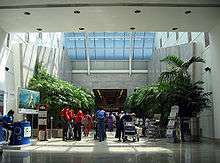
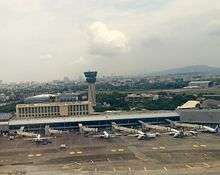

The airport has two main passenger terminal complexes. Terminal 1 at Santacruz was dedicated for domestic passengers, and today, it is only for domestic passengers of select low-cost airlines. Terminal 2 at Sahar was the former arc-shaped international terminal, and today, the new X-shaped building is an integrated terminal catering to both international and domestic passengers.
Currently operational terminals
Terminal 1
Terminal 1, locally known as Santacruz Airport, is used for domestic flights primarily operated by low-cost carriers. This was the original Santacruz building that was Mumbai's first passenger terminal which was once integrated, however was renamed Terminal 1 after the opening of the Sahar building for international operations and became a domestic operations terminal. It was refurbished several times over the decades, the most recent being during the 2000s. It was further divided into Terminals 1A, 1B, and 1C after their permanent closure during the course of late 1990s and early 2000s. It was used by SpiceJet, GoAir, and IndiGo, but after Jet Airways dissolved on 17 April 2019, select flights from all the Terminal 1B airlines moved into the newer T2 building.[46] The terminal has 11 passenger boarding bridges. MIAL renamed Terminal 1B to T1 in January 2017 to help fliers identify it easily.[47] Several airlines operate airconditioned Cerita buses owned by BEST to ferry passengers between the terminal and aircraft.[48]
Terminal 2
Terminal 2, locally known as Sahar Airport, handles all international flights and domestic flights from Air India and Vistara, along with few IndiGo, GoAir and SpiceJet flights.
Larsen & Toubro (L&T) was awarded the contract to construct the new Terminal 2, better known as T2, in order to differentiate it from the older Terminal 2 building. Skidmore, Owings & Merrill (SOM) was the architectural designer of the project. SOM also provided the schematic design of structure and MEP and the detailed structural design of the roof. Detailed design of the foundations and the rest of the structure and civil works, the MEP, IT and airport systems, including the full construction documentation of the project was carried out by L&T's in-house design team, EDRC (Engineering Design and Research Center). The terminal covers a land area of 210,000 square metres and has replaced the previous International Terminal (which has already been demolished). The entire project was estimated to cost ₹98 billion (US$1.4 billion) and employ over 12,000 workers.[49] The X-shaped terminal has a total floor area of 450,000 square metres across four floors and handles both domestic and international passengers. It includes new taxiways and apron areas for aircraft parking designed to cater to 40 million passengers annually.[50] The structure has boarding gates on two piers extending southwards from a central processing building featuring a 42-metre high roof employing over 20,000 metric tonnes of fabricated steel covering 30 acres.[51] However, the eastern pier of T2 remains truncated due to non-clearance of slums in the adjoining plot, giving an asymmetrical look when seen from above. The new T2 building operates Multiple Aircraft Ramp System (MARS) stands and swing gates, so that a single stand can accommodate either one wide body aircraft or two narrow body aircraft, in either domestic or international configuration.[52] The new terminal is connected by the six-lane Sahar Elevated Access Road to the Western Express Highway. A metro rail link to the terminal is under construction.[53]
The new terminal has around 21,000 square meters of retail space, lounges and travel services, over 5,000 square meters of landscaping and a multi level car park for 5,000 cars.[54] The parking Management System and Revenue control system for the entire MLCP has been designed and supplied by SKIDATA.[55] It has 192 check-in counters and 60 immigration counters for departing passengers, and 14 baggage carousels and 76 immigration counters for arriving passengers. To transfer passengers across its four levels, the building has 48 escalators and 75 elevators. The terminal also features 42 travelators.[50] In the initial phase of development, the apron adjoining T2 provides a total of 48 stands including 3 Code F stands (for the A380). In the final phase of development a total of 38 Code E/F contact stands, 14 Code E/F remote stands and 20 Code C remote stands are provided (total 72 stands).[52]
The GVK Lounge, the first common luxury lounge at an airport in India, opened in November 2014.[56] The lounge is open to First class and Business class travellers and can accommodate 440 guests at a time. It is spread over 30,000 square feet across two levels of the terminal and has a library, a business centre and fine-dining options, apart from the usual facilities like concierge services, smoking zone, food and beverage, bar, luxury spa, shower area and a relaxation area. The luxury lounge has won the 'World's Leading Airport Lounge – First Class 2015' award at the World Travel Awards 2015 held in Morocco.[57]
The terminal also houses the Niranta Airport Transit Hotel and the 32-room hotel is the first of its kind in the country.[58] It is located on Level 1 of the terminal and rooms may be booked by passengers who have checked into the airport.[59] IWG plc, operating under the brand Regus operates a shared workspace out of the terminal.[60]
The old international terminal was closed permanently at 13:00 on 12 February 2014, and international operations from the new terminal commenced from the same day.[13] The first arrival was Air India flight 343 (an Airbus A330-200) from Singapore via Chennai, and the first departure was Jet Airways flight 118 (a Boeing 777-300ER) to London. It was inaugurated by the then Prime Minister of India Manmohan Singh.[61] The domestic operations at T2 were launched on 9 January 2015, with the inaugural flight of Vistara arriving from Delhi.[62] Vistara initially operated from level 4 of the terminal, which is being used only by international passengers, but in July 2015, they shifted to level 3, which will be used only for domestic operations.[62][63] Air India shifted all its domestic operations from Terminal 1B to T2 on 1 October 2015 making it the second airline to operate domestic flights from the T2 Terminal, to ease their International and Domestic passenger transfers,[64][65][66][67] and Jet Airways shifted its domestic operations to T2 on 15 March 2016, facilitating a seamless transfer experience for its passengers,[68] whereas all other domestic airlines, namely Indigo, GoAir, and SpiceJet, took place, both departure and arrival, at the older Santacruz building.[67]
After the demise of Jet Airways on 17 April 2019, additional domestic flights moved to T2 from T1 now include select flights from all remaining domestic airlines, namely IndiGo (flight numbers 6E5300-5399), GoAir (flight numbers G82000-2999), Spice Jet (flight numbers SG6000-6999), and all AirAsia Indian domestic flights.
| Facilities | Current | Earlier |
|---|---|---|
| Parking stands for aircraft | 108 | 84 |
| Boarding bridges | 60 | 25 |
| Check-in counters | 192 | 135 |
| Car parking | 5,000 | 3,600 |
- Car Parking and Passenger Arrivals
All vehicles arriving at T2 to pick up arriving passengers are routed via the Multi-Level Car Park and are charged a fee to counter traffic congestion at the airport. Four wheelers are charged a minimum fee of ₹140 (US$2.00) for 30 minutes in general parking and two-wheelers ₹Convert for 240 minutes.[70]
General-Aviation Terminal
CSIA's General Aviation Terminal for private and non-scheduled flight operators (NSOPs) is located at Kalina on the south-west side of the airfield. The terminal was approved for international operations in April 2011, making CSIA the first airport in India to have a self-contained terminal for handling round the clock domestic and international flight operations for private and NSOPs. The terminal offers facilities for passengers departing and arriving on private aircraft and business jets. The terminal has two exclusive lounges, two conference halls, two crew rest rooms and a café bar.[71]
Previous terminals
Terminal 1A, 1B, and 1C
When the Sahar terminal was opened in the 1980s, the terminal at Santacruz reverted to being a domestic terminal. The terminal consisted of three structures, Terminals 1A, 1B, and 1C.
- Terminal 1A - It was opened in April 1992, and was used solely by Indian Airlines (now Air India). In 2005, Kingfisher Airlines also began operating from 1A, after it entered into an agreement to source all ground handling and terminal space from Indian Airlines.[72] In June 2013, shortly after Kingfisher ceased operations, MIAL allocated the vacant space to GoAir.[73] From 1 October 2015, Air India moved all of its Terminal 1A operations to the new Terminal 2. GoAir moved its departure operations to Terminal 1B on that same date, resulting in the closure of the Terminal 1A departures level. GoAir, however, continued to use Terminal 1A's arrivals level[74] until 15 March 2016 when its arrivals were also shifted to Terminal T1B[75] and Terminal 1A was shut.
- Terminal 1B - This was the original Santacruz building that was Mumbai's first passenger terminal which was once integrated, however was renamed Terminal 1 after the opening of the Sahar building for international operations and became a domestic operations terminal.
- Terminal 1C - It was built at a cost of ₹ 3 billion and opened in April 2010. Architectural design was provided by Hafeez Contractor. EDRC, the in-house design unit of the EPC contractor Larsen & Toubro (L&T) performed the Structural, MEP and IT / Airport systems design. The terminal had six passenger boarding bridges and allowed connectivity between Terminals 1A and 1B. It was spread over 297,194 sq ft across three levels and had a seating capacity of about 900 passengers. Level 1 housed the offices of MIAL and some airlines, Level 2 comprised the security-hold area for passengers after checking in at either Terminal 1A or 1B. Level 3 accommodated a food court.[76] The building served as a boarding-only facility for all airlines. Passengers entered this facility via Terminal 1B.
In January 2017, MIAL renamed the Terminal 1B as T1.[47]
Old Terminal 2 (Divided into 2A, 2B, and 2C)
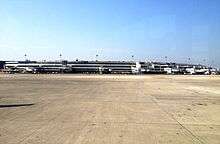
Terminal 2 of the airport is located at Sahar Village, in Andheri (East). Designed by Aéroports de Paris and opened in January 1981, Terminal 2 was built in three modular phases as Terminals 2A, 2B, and 2C. Each module had a capacity of 2.5 million passengers. This terminal had an area of 120,000 m2 (1,300,000 sq ft).[20] The terminal structure was laid out in a space-saving vertical arrangement with separate levels for arrivals and departures. An overpass on the city-side took passengers to the upper level departure forecourt.[23]
The original terminal was a convex shaped single concourse building with 14 Code E contact stands. The greater T2 apron also provided a further 15 Code D/E and 6 Code C remote stands. This gave a total of 35 stands on the existing apron.[52] The departures section of 2A had 42 check-in counters, 18 more than in the international section at the Santacruz terminal. After completing customs and immigration formalities, the departing travellers were led down to a mezzanine floor where five elongated nodules connect the terminal with the aircraft via aerobridges.[23]
- Terminal 2A - This first phase of the terminal complex was completed at a cost of ₹180 million (US$2.5 million)[20] and it served most international carriers. Its boarding gates 3 to 8 were the first aerobridges installed in the subcontinent. It was decommissioned and demolished in January 2009[77] to make way for the new T2 structure.
- Terminal 2B - It costed ₹220 million (US$3.1 million) and was completed in 1984.[20] It served Air India and carriers handled by Air India between September 1986 and October 1999 and was decommissioned when Terminal 2C opened. It was extensively refurbished and made operational once again following the demolition of Terminal 2A.
- Terminal 2C - Inaugurated in October 1999, it was originally and exclusively for Air India, Air India Express and those carriers whose ground operations were handled by Air India.
Terminals 2B and 2C were decommissioned in February 2014 when the new T2 took over operations. They were demolished later that year, so that the remainder of the new T2 could be completed.[78]
Cargo
The Air Cargo Complex, located west of the international passenger Terminal 2, has been in operation since 1977.[79] The cargo apron is capable of handling five wide-bodied aircraft. In 2009–10, the airport handled 385,937 metric tonnes of International Cargo and 165,252 metric tonnes of Domestic Cargo.[80] Air India (AI) and Mumbai International Airport Pvt Ltd (MIAL) have been appointed as custodians of cargo by the Central Board of Excise and Customs at Mumbai. The Cargo Terminal has a Centre for Perishable Cargo (CPC) with an area of 1844 m2 for perishable and temperature sensitive international export shipments, strong rooms of 115 m2 for storage of valuable cargo and storage areas for dangerous goods in both import and export warehouses, dedicated Unaccompanied Baggage handling and clearance areas and 9 coloured X-ray cargo screening machines for export cargo.[81]
Apart from handling 65% of the international volumes at CSIA, MIAL also operates a Common User Domestic Cargo Facility. After taking over the redevelopment work of the airport in 2006, MIAL commissioned an offshore Common User Terminal (CUT) near the Marol pipeline as a temporary arrangement. In June 2016, MIAL opened a new domestic cargo CUT near the Western Express Highway in Vile Parle.
The CUT has been outsourced to Concor Air Ltd. on a Build-operate-transfer basis. The terminal has the capacity to handle 300,000 metric tonnes of cargo annually and is built on an area of 60,000 square feet. The Cargo Terminal is an "elevated terminal structure" where all arriving domestic cargo is managed from the basement level while departing cargo is handled at the upper level. Air India and Blue Dart handle their own domestic cargo operations at their own terminals.[82] Blue Dart opened its dedicated cargo facility at Mumbai airport near Terminal 1 on 7 February 2019. The facility measures 4,300 square meters and has air-side and city-side access, allowing for faster transfer of shipments.[83]
Airlines and destinations
Passenger
All flights are cancelled till 3 May due to COVID-19.
| Airlines | Destinations |
|---|---|
| Aeroflot | Moscow–Sheremetyevo (resumes 2 July 2020)[84] |
| Air Arabia | Sharjah |
| Air Canada | Seasonal: Toronto–Pearson |
| Air China | Beijing–Capital (suspended) |
| Air France | Paris–Charles de Gaulle |
| Air India | Abu Dhabi, Ahmedabad, Amritsar, Aurangabad, Bangalore, Bangkok–Suvarnabhumi, Bhopal, Bhubaneswar, Chandigarh, Chennai, Coimbatore, Colombo–Bandaranaike, Dehradun, Delhi, Doha,[85] Dubai–International, Frankfurt, Goa, Hong Kong, Hubli, Hyderabad, Indore, Jaipur, Jamnagar, Jeddah, Jodhpur, Kochi, Kolkata, Kozhikode, Kuwait, London–Heathrow, Lucknow, Madurai, Mangalore, Muscat, Nagpur, Nairobi–Jomo Kenyatta, Newark, Patna, Raipur, Rajkot, Riyadh, Shanghai–Pudong, Singapore, Thiruvananthapuram, Udaipur, Varanasi, Visakhapatnam |
| Air India Express | Doha, Dubai–International, Sharjah, Vijayawada |
| Air Mauritius | Mauritius |
| Air Seychelles | Seychelles |
| Air Tanzania | Dar es Salaam (suspended) |
| AirAsia India | Bangalore, Chandigarh, Chennai, Delhi, Goa, Hyderabad, Indore, Kochi, Kolkata, Srinagar |
| Alliance Air | Bhavnagar, Bhuj, Diu, Shirdi |
| All Nippon Airways | Tokyo–Narita |
| Bangkok Airways | Bangkok–Suvarnabhumi |
| Bhutan Airlines | Seasonal: Paro |
| British Airways | London–Heathrow |
| Cathay Pacific | Hong Kong |
| Delta Air Lines | New York–JFK |
| EgyptAir | Cairo |
| El Al | Tel Aviv |
| Emirates | Dubai–International |
| Ethiopian Airlines | Addis Ababa |
| Etihad Airways | Abu Dhabi |
| flydubai | Dubai–International |
| GoAir | Abu Dhabi, Ahmedabad, Bangalore, Bangkok–Suvarnabhumi, Bhubaneswar, Chandigarh, Chennai, Delhi, Goa, Indore, Jaipur, Jammu, Kannur, Kochi, Kolkata, Leh (begins 1 May 2020), Lucknow, Muscat, Nagpur, Patna, Phuket, Port Blair, Ranchi, Srinagar, VaranasiSeasonal: Malé |
| Gulf Air | Bahrain |
| IndiGo | Abu Dhabi, Ahmedabad, Allahabad, Amritsar, Aurangabad,[86] Bagdogra, Bangalore, Bangkok–Suvarnabhumi, Bhopal, Bhubaneswar, Chandigarh, Chengdu (begins 15 June 2020),[87] Chennai, Coimbatore, Dammam,[88] Dehradun, Delhi, Doha, Dubai–International, Goa, Guwahati, Hubli, Hyderabad, Indore, Jabalpur, Jaipur, Jammu, Jeddah, Jodhpur, Kathmandu (begins 25 June 2020),[89] Kochi, Kolkata, Kozhikode, Kuwait, Lucknow, Malé, Mangalore, Muscat, Nagpur, Patna, Raipur, Ranchi, Riyadh, Singapore, Surat, Tirupati, Thiruvananthapuram, Udaipur, Vadodara, Varanasi |
| Iran Air | Tehran–Imam Khomeini (suspended) |
| Iraqi Airways | Baghdad, Najaf |
| Jazeera Airways | Kuwait |
| Kenya Airways | Nairobi–Jomo Kenyatta |
| KLM | Amsterdam |
| Korean Air | Seoul–Incheon (suspended) |
| Kuwait Airways | Kuwait |
| Lufthansa | Frankfurt, Munich (both suspended) |
| Malaysia Airlines | Kuala Lumpur–International |
| Malindo Air | Kuala Lumpur–International |
| Nepal Airlines | Kathmandu |
| Oman Air | Muscat |
| Qatar Airways | Doha |
| RwandAir | Guangzhou (suspended), Kigali |
| Saudia | Jeddah, Riyadh Seasonal: Medina |
| Singapore Airlines | Singapore |
| SpiceJet | Ahmedabad, Amritsar, Bagdogra, Bangalore, Bangkok–Suvarnabhumi, Belgaum, Bhopal, Chennai, Coimbatore, Dehradun, Delhi, Dhaka, Dubai–International, Durgapur, Goa, Gorakhpur, Guwahati, Hong Kong (resumes 16 May 2020),[90] Hyderabad, Jabalpur, Jaipur, Jeddah, Jodhpur, Kandla, Kanpur, Kochi, Kolkata, Kozhikode,[91] Leh (begins 20 April 2020),[92] Madurai, Mangalore, Patna, Porbandar, Rajkot, Ranchi, Riyadh, Srinagar, Surat, Thiruvananthapuram, Tirupati, Varanasi |
| SriLankan Airlines | Colombo–Bandaranaike |
| Star Air | Belgaum |
| Swiss International Air Lines | Zurich |
| Thai Airways | Bangkok–Suvarnabhumi |
| Thai Lion Air | Bangkok–Don Mueang |
| Thai Smile | Bangkok–Suvarnabhumi |
| TruJet | Jalgaon, Kolhapur, Nanded |
| Turkish Airlines | Istanbul |
| United Airlines | Newark |
| Uzbekistan Airways | Tashkent |
| VietJet Air | Hanoi (begins 14 May 2020),[93] Ho Chi Minh City (begins 15 May 2020)[93] |
| Virgin Atlantic | London–Heathrow |
| Vistara | Ahmedabad, Bangalore, Chandigarh, Chennai, Colombo–Bandaranaike, Delhi, Dubai–International, Goa, Hyderabad, Jodhpur, Kolkata, Singapore, Udaipur, Varanasi |
| Yemenia | Aden |
Cargo
| Airlines | Destinations |
|---|---|
| Aerologic[94] | Frankfurt |
| Atlas Air | Bahrain, Dubai, Guangzhou, Hahn, Hong Kong, London-Stansted, Seoul-Incheon, Shanghai-Pudong, Singapore, Tokyo-Narita, Toledo |
| Blue Dart Aviation[95] | Ahmedabad, Bangalore, Chennai, Delhi, Hyderabad, Kochi, Kolkata, Patna, Raipur |
| Cargolux | Bahrain, Luxembourg, Taipei-Taouyuan |
| Cathay Pacific Cargo[96][97] | Amsterdam, Bangkok-Suvarnabhumi, Chennai, Frankfurt, Hong Kong, London-Heathrow, Milan-Malpensa, Paris-Charles de Gaulle |
| China Airlines[98] | Amsterdam, Taipei-Taouyuan |
| Emirates SkyCargo[99] | Dubai-Al Maktoum, Shanghai-Pudong |
| Ethiopian Airlines Cargo[100] | Addis Ababa, Guangzhou, Shanghai-Pudong |
| FedEx Express | Bangkok-Suvarnabhumi, Dubai-International, Guangzhou, Hahn, Hong Kong, Memphis, Paris-Charles de Gaulle, Tokyo-Narita |
| Fits Air | Chennai |
| Lufthansa Cargo[101] | Almaty, Cologne/Bonn, Bangkok-Suvarnabhumi, Frankfurt, Hong Kong, Krasnoyarsk, Leipzig/Halle |
| MASkargo[102] | Kuala Lumpur–International |
| Qatar Airways Cargo[103] | Ahmedabad, Doha |
| Quikjet Airlines[104] | Bangalore, Chennai, Delhi, Hyderabad |
| Saudia Cargo[105] | Dammam, Jeddah, Riyadh |
| Sichuan Airlines[106] | Nantong, Xi'an |
| Singapore Airlines Cargo | Brussels, Singapore |
| Turkish Airlines Cargo[107] | Doha, Dubai-Al Maktoum, Istanbul-Atatürk, Hanoi |
| UPS Airlines[108] | Amsterdam, Bangkok-Suvarnabhumi, Barcelona, Cologne/Bonn, Dubai-International, Guangzhou, Hahn, Hong Kong, Kuala Lumpur-Sepang, Leipzig/Halle, Shenzhen, Taipei-Taoyuan |
| Uzbekistan Airways[109] | Baku, Tashkent |
Connectivity
![]()
![]()
![]()
![]()
The Brihanmumbai Electricity Supply and Transport Undertaking (BEST) operates air-conditioned buses to the Airport from various parts of the city and the suburbs.[111] The Navi Mumbai Municipal Transport (NMMT) runs bus services to the Airport from various nodes of Navi Mumbai.[112]
Upcoming airport metro stations
Line 3 of the Mumbai Metro will run underground from Cuffe Parade to SEEPZ and serve CSIA via three stations – one each at the Santacruz and Sahar terminals and one in the GVK SkyCity.[113] It will reduce the commute time between Colaba and the airport to 40 minutes.[114]
In early 2012, the MMRDA held talks with MIAL to either construct or finance the construction of three of the line's stations.[115] MIAL agreed to bear the cost of constructing the three stations, expected to total ₹ 777 crore, because of the potential increase in passenger convenience. However, CSIA placed conditions before MMRDA for the corridor;[115]
- The metro line should operate twenty-four hours a day in order to serve passengers of international flights scheduled at odd hours.
- A provision be made for a check-in facility at all metro stations.
MIAL specified that the commercial rights of the three stations it constructs will fully rest with the authority, and that revenue earned from any commercial activity on the premises would go to MIAL. It would undertake the design and civil construction of the stations, costing ₹ 600 crore, on its own, and would pay the estimated cost of electromechanical equipment (around ₹ 177 crore) to MMRDA in three equal instalments over three years.[113]
Accidents and incidents
1940s
- On 12 July 1949, Franeker , a Lockheed L-749-79-33 Constellation (registered PH-TDF) crashed into hills between Ghatkopar and Powai killing 33 passengers and 11 crew members. The victims included a large number of American journalists including Pulitzer Prize winner Hubert Renfro Knickerbocker. The blame was put on pilot error.[116]
1950s
- On 19 July 1959, Rani of Aera, a Lockheed L-1049G Super Constellation (registered VT-DIN) carrying 46 people (39 passengers and 7 crew) approached Santacruz Airport in conditions of poor visibility due to rain. The captain was using an altimeter with the barometric pressure set at 29.92". The aircraft crashed and suffered damage beyond repair. There were no fatalities.[117]
1960s
- On 28 July 1963, United Arab Airlines Flight 869 bound from Tokyo to Cairo, with a partial stop in Bombay, crashed into the Arabian Sea before approaching Santacruz Airport. All 63 people on board (55 passengers and 8 crew members) died, including 24 passengers from the Philippines who were due to travel to Greece to attend the 11th World Scout Jamboree.
- On 28 May 1968, a Garuda Indonesian Airways Convair 990 bound for Karachi, Pakistan, crashed into the sea shortly after taking off from Santa Cruz. All 29 people on board (15 passengers and 14 crew members) died. In addition, there was one casualty on the ground.
1970s
- On 12 October 1976: Indian Airlines Flight 171, a Sud Aviation SE 210 Caravelle had its right engine catch fire shortly after takeoff. The crew attempted to return, but the plane crashed approximately 1000 feet short of Runway 09. All six crew members and their 89 passengers were killed.
- On 1 January 1978: Air India Flight 855 a Boeing 747-237B crashed into the Arabian Sea after takeoff from Mumbai, killing all on board (213 persons; 190 passengers, 23 crew).
- On 4 August 1979: a Hawker Siddeley HS 748 aircraft was approaching Sahar International Airport (now Chhatrapati Shivaji Maharaj International Airport) at night and in poor weather when it flew into high terrain approximately 6 mi (9.7 km) from the airport, killing the four crew and their 41 passengers.
1980s
- On 25 March 1988: In an apparent terrorist attack, a gunman opened fire[118] with an automatic pistol on Alitalia crew as they boarded their crew bus en route to a downtown Bombay hotel, wounding an Alitalia pilot. Later press accounts indicated that the attacker may have mistaken the Alitalia for a Pan Am crew[119] because of similarities between their uniforms. The gunman was initially identified as Iranian,[118] but later identified as a Lebanese national affiliated with Abu Nidal.[119]
1990s
- On 12 March 1993, Grenades were thrown at Bay-52 terminal of the airport. This was one of the incidents of 1993 Bombay bombings.[120]
21st century
- On 24 May 2003, a Central Industrial Security Force (CISF) constable shot dead his deputy superintendent after being refused leave. He held six colleagues hostage, but later surrendered in the presence of then Maharashtra Deputy Chief Minister Chhagan Bhujbal and Deputy Commissioner of Police Bipin Bihari.[121][122]
- On 4 September 2009, Air India Flight 829 a Boeing 747–437 flying on the Mumbai-Riyadh route caught fire at the Airport. The fire started in number one engine while the aircraft was taxiing to Runway 27 for take-off. An emergency evacuation was carried out with no injuries among the 228 people (213 passengers and 15 crew) on board.[123]
- In January 2015, a man climbed the airport perimeter wall with an intension to commit suicide, but was apprehended by CISF personnel after the alarms alerted them. This comes a few days after a mentally unstable naked man climbed the walls on 23 December 2014.[124]
- On 1 July 2019, a SpiceJet Boeing 737-800, flight SG 6237 arriving from Jaipur, skidded and overshot at the main runway in heavy rain. No passengers or crew were injured.[125]
- In December 2015, an Air India service engineer died in a freak accident after being sucked into the engine of an airplane during pushback. The Air India flight was bound for Hyderabad.[126]
See also
- L&T Realty
- Larsen & Toubro
- List of airports in India
- List of the busiest airports in India
- Mumbai Port Trust
- Navi Mumbai International Airport
References
- "Traffic News for the month of March 2019: Annexure-III" (PDF). Airports Authority of India. 1 May 2019. p. 3. Retrieved 1 May 2019.
- "Traffic News for the month of March 2019: Annexure-II" (PDF). Airports Authority of India. 1 May 2019. p. 3. Archived from the original (PDF) on 1 May 2018. Retrieved 1 May 2019.
- "Traffic News for the month of March 2018: Annexure-IV" (PDF). Airports Authority of India. 1 May 2018. p. 3. Archived from the original (PDF) on 1 May 2018. Retrieved 1 May 2018.
- "Traffic News for the month of January 2017: Annexure III" (PDF). Airports Authority of India. p. 3. Archived (PDF) from the original on 2 February 2018. Retrieved 1 March 2018.
January 2017: 4,114,568
- "Traffic News for the month of February 2017: Annexure III" (PDF). Airports Authority of India. p. 3. Archived (PDF) from the original on 2 February 2018. Retrieved 1 March 2018.
February 2017: 3,590,011
- "Traffic News for the month of March 2017: Annexure III" (PDF). Airports Authority of India. p. 3. Archived (PDF) from the original on 2 February 2018. Retrieved 1 March 2018.
March 2017: 3,674,156
- "Traffic News for the month of December 2017: Annexure III" (PDF). Airports Authority of India. p. 3. Archived (PDF) from the original on 2 February 2018. Retrieved 1 March 2018.
April–December 2017: 35,825,524
Total passengers in calendar year 2018: 49,877,918
- "Traffic News for the month of February 2017: Annexure III" (PDF). Airports Authority of India. p. 3. Archived (PDF) from the original on 2 February 2018. Retrieved 1 March 2018.
- Manju, V. (13 May 2017). "Now, Mumbai world's busiest airport with only one runway". The Times of India. Retrieved 13 May 2017.
- "Mumbai airport" (PDF). Archived from the original (PDF) on 20 January 2015.
- "Mumbai ATC handles a about 50 flights an hour". The Times of India. 20 September 2014. Retrieved 29 September 2014.
- Devanjana Nag (7 March 2018). "Delhi's IGI, Mumbai's Chhatrapati Shivaji Maharaj airports beat Singapore Changi, Seoul Incheon to become world's best". The Financial Express. Retrieved 2 May 2018.
- "CSIA voted Best Airport in India and Central Asia". The Hindu Business Line. 21 March 2016. Retrieved 22 March 2016.
- "Only 2 AAI airports are making profits". Deccan Herald. New Delhi. 17 March 2015. Retrieved 21 March 2015.
- "Bidvest.co.za". Bidvest.co.za. Retrieved 24 August 2010.
- "Mumbai International Airport Limited – MIAL". Association of Private Airport Operators. Retrieved 4 May 2016.
- "Mumbai airport T2 to open for passengers on Feb 12". Business Standard. 10 December 2013. Retrieved 11 December 2013.
- "With maiden Air India flight, T2 opens to public". Daily News & Analysis. 13 February 2014. Retrieved 13 February 2014.
- "GVK CSIA Project". GVK Industries Ltd. Retrieved 21 September 2012.
- "Sahar elevated corridor: Five minute 'short-cut' to airport from Western Express High now open to public". The Times of India. 13 February 2014. Retrieved 13 February 2014.
- "Mumbai airport renamed as Chhatrapati Shivaji 'Maharaj' International Airport". The Indian Express. 30 August 2018. Retrieved 12 January 2019.
- "Maharashtra State Gazetteers – Greater Bombay District". Cultural.maharashtra.gov.in. Retrieved 28 December 2017.
- "RAF Santacruz". rafweb.org. 9 January 2011. Retrieved 17 September 2011.
- "Transport by Air". Maharashtra State Gazetteers. 1987. Retrieved 5 March 2012.
- "Airfield, Santacruz". Hansard. 30 October 1946. Retrieved 17 September 2011.
- "Santacruz to be developed". Flight Global. 19 May 1949. Retrieved 17 September 2011.
- "Travellers can breathe freely with brand new and improved terminal at Sahar in Bombay". India Today. 31 December 1980. Retrieved 14 August 2019.
- "Bombay airport: A costly inferno". 15 October 1979. Retrieved 20 January 2016.
- Rekha Jain; G. Raghuram; Rachna Gangwar (1 May 2007). "Airport Privatization in India: Lessons from the Bidding Process in Delhi and Mumbai" (PDF). Archived from the original (PDF) on 17 October 2015. Retrieved 7 January 2014.
- "GVK website, CSIA". gvk.com. Retrieved 19 January 2012.
- "CSIA.in". CSIA.in. 8 February 2008. Archived from the original on 22 June 2009. Retrieved 24 August 2010.
- "Common Agreement Document of the A380 Airport Compatibility Group Version 2.1 Archived 10 January 2006 at the Wayback Machine" page 8, European Civil Aviation Conference, December 2002. Retrieved: 4 December 2012.
- "Mumbai airport aims high; sets eyes on 48 flights per hour by next year". Indian Express. 11 March 2011. Retrieved 7 September 2012.
- "Mumbai shifts to single runway to boost flight capacity". The Times of India. 22 August 2013. Retrieved 22 August 2013.
- "19 more flight slots for city airport this winter". Hindustan Times. 20 October 2012. Archived from the original on 10 October 2013. Retrieved 24 October 2012.
- "AIRAC AIP Supplement" (PDF). Airports Authority of India. Archived from the original (PDF) on 18 March 2014. Retrieved 19 March 2013.
- Shalya, Chinmayi (11 September 2012). "Mumbai airport to get satellite-based navigation system". Times of India. Mumbai. Retrieved 21 March 2015.
- Shalya, Chinmayi (4 December 2008). "Ban flight of civilian planes over BARC: Experts". Times of India. Mumbai. Retrieved 21 March 2015.
- "Chhatrapati Shivaji Maharaj International Airport, Mumbai, Maharashtra". Airport Technology. Retrieved 27 July 2010.
- "MIAL ATC Tower". JSW Severfield Structures Limited. Retrieved 7 June 2012.
- "Tallest in India, new ATC tower to boost Mumbai air traffic". Business Standard. 18 October 2013. Retrieved 19 October 2013.
- "Air Traffic Control shifts to new tower". Mumbai Mirror. 1 January 2014. Retrieved 1 January 2014.
- "Air Traffic Control Tower, Chhatrapati Shivaji Maharaj International Airport". Arup. Retrieved 7 July 2013.
- "Mumbai's new ATC Tower scales futuristic heights". Economic times. 11 May 2011.
- "New ATC tower to be inaugurated by October". The Times of India. 25 March 2013. Retrieved 25 March 2013.
- "Work on new ATC tower to begin soon". The Indian Express. 31 March 2009. Retrieved 7 June 2012.
- "IATA Warns of dangers of temporary runway closures in Mumbai" (PDF). IFALPA. 9 September 2005. Archived from the original (PDF) on 18 March 2015. Retrieved 1 January 2014.
- "Mumbai airport to get new traffic control tower". Business Standard. 4 April 2011. Retrieved 7 June 2012.
- "MIAL begins work to pull down old ATC". Mumbai Mirror. 16 October 2014. Retrieved 17 October 2014.
- "Domestic Airlines". CSIA website. Retrieved 13 September 2015.
- "Mumbai's domestic air terminal renamed from 1B to T1". Hindustan Times. 3 January 2017. Retrieved 3 January 2017.
- Rao, Shashank (3 June 2010). "12 King Long buses for Jet Airways". Hindustan Times. Mumbai. Retrieved 5 February 2015.
- "CSIA press release" (PDF). CSIA.
- "CSIA Master plan". CSIA. CSIA.
- "Geodesic Techniques". Retrieved 4 June 2015.
- "CSIA airport apron Case Study" (PDF). Archived from the original (PDF) on 27 May 2013.
- "Mumbai airport's big face-lift: The story so far". CNN Travel. Archived from the original on 27 October 2012. Retrieved 4 June 2015.
- "New terminal, network of taxiways for Mumbai by 2013 – The Times of India". The Times of India. 21 November 2011.
- "HINDITRON – High Performance Computing – Boston". Archived from the original on 20 June 2015. Retrieved 4 June 2015.
- "Now, luxury lounge at CSIA for first, business class travellers". The Indian Express. 26 November 2014. Retrieved 1 January 2016.
- "GVK Lounge at CSIA selected as 'World's Best First Class Lounge'". Business Standard. 24 December 2015. Retrieved 1 January 2016.
- "With transit hotel at Mumbai airport, now fliers won't lose sleep". mid-day. 24 July 2015. Retrieved 1 October 2015.
- "Niranta Hotel". CSIA website. Retrieved 1 October 2015.
- Verma, Prachi (8 April 2016). "Regus to open facility at Mumbai airport". The Economic Times. Retrieved 26 August 2019.
- Mishra, Lalatendu (10 January 2014). "Swanky terminal inaugurated at Mumbai international airport". The Hindu. Retrieved 27 January 2020.
- "Vistara to operate out of Mumbai International Airport's new T2 terminal". The Economic Times. 1 January 2015. Retrieved 2 January 2015.
- "Test drive at T2 to check readiness for domestic flights". Mid-Day. 25 July 2015. Retrieved 13 September 2015.
- "Air India to make Mumbai its secondary hub". Business Standard. 1 October 2015. Retrieved 1 October 2015.
- "Air India shifts all operations to Mumbai airport's T2 – Times of India". The Times of India. Retrieved 18 January 2016.
- "Domestic flights to operate from Terminal −2". www.airindia.in. Retrieved 18 January 2016.
- "Air India to move to Mumbai airport T2 from 1 Oct". Business Standard India. 16 September 2015. Retrieved 18 January 2016.
- "Mumbai:Jet Airways shifts domestic operations to Terminal 2 from today". The Indian Express. 15 March 2016. Retrieved 17 March 2016.
- "CSIA.in". CSIA.in. Archived from the original on 8 October 2011. Retrieved 18 October 2011.
- "Parking Facility". csia.in. Retrieved 26 November 2019.
- "MIAL General Aviation Terminal – Press release" (PDF). Retrieved 27 March 2017.
- "Kingfisher Airlines to take wings on May 9". DanceWithShadows.com. 8 May 2005. Archived from the original on 12 November 2010. Retrieved 1 January 2016.
- "GoAir to use Terminal 1A in Mumbai airport from July 1". The Hindu Business Line. Retrieved 4 June 2015.
- "Air India to move to Mumbai airport T2 from Oct 1". Business Standard. 16 September 2015. Retrieved 1 January 2016.
- "Terminal 1B in Mumbai to handle GoAir arrivals from March 15". The Economic Times. 14 March 2016. Retrieved 17 March 2016.
- "Mumbai airport unveils new domestic terminal". Business Standard. 18 April 2010. Retrieved 17 February 2013.
- "Razing of terminal 2A begins at airport". Indian Express. 7 January 2009. Retrieved 26 December 2011.
- Mishra, Lalatendu (10 January 2014). "Swanky terminal inaugurated at Mumbai international airport". The Hindu. Mumbai. Retrieved 4 February 2015.
- "MIAL Air Cargo Complex" (PDF). Archived from the original (PDF) on 31 May 2012. Retrieved 10 December 2019.
- "MIAL Air Cargo Performances" (PDF). Archived from the original (PDF) on 31 May 2012. Retrieved 10 December 2019.
- "MIAL Cargo Facilities" (PDF). Archived from the original (PDF) on 31 May 2012. Retrieved 10 December 2019.
- "MIAL sees cargo volumes flying on e-comm business". Daily News & Analysis. 7 June 2016. Retrieved 12 June 2016.
- "Blue Dart launches a new state-of-the-art facility at Mumbai International Airport". India Infoline. 8 February 2019. Retrieved 14 August 2019.
- Liu, Jim (2 September 2019). "Aeroflot plans Mumbai service resumption in July 2020". Routesonline. Retrieved 2 September 2019.
- "Air India to commence Mumbai-Doha service in Feb-2020". CAPA. Retrieved 9 January 2020.
- "New Flights Information, Status & Schedule | IndiGo". www.goindigo.in.
- Liu, Jim. "IndiGo S20 International Expansion as of 24FEB20". Routesonline. Retrieved 25 February 2020.
- "IndiGo to start flights to Dammam from three Indian cities". Livemint. 16 January 2020. Retrieved 16 January 2020.
- "IndiGo to commence Mumbai-Kathmandu service in Jun-2020". CAPA. Retrieved 6 February 2020.
- "SpiceJet Flight Schedule". SpiceJet. Retrieved 10 January 2020.
- "SpiceJet's Flights Schedule and Information for domestic and international flights". Retrieved 13 February 2020.
- "SpiceJet flight schedule". SpiceJet. Retrieved 12 January 2020.
- "VietJet Air S20 India service expansion". Airlineroute. Retrieved 27 January 2020.
- "The customized AeroLogic network". Official Website of Aerologic. Retrieved 2 May 2018.
- "Corporate details, Blue dart Aviation". bluedartaviation.com. Retrieved 10 September 2015.
- "Check Flight Schedule: Cathay Pacific Cargo". Retrieved 27 February 2017.
- "Network- Cathay Pacific". Cathay Pacific Cargo. Retrieved 27 February 2017.
- News, Indian Transport and Logistics. "China Airlines Cargo sets Nov 16 date for freighter service from Mumbai | Aviation". www.itln.in. Retrieved 10 December 2019.
- "Shivaji maharaj". chhatrapatishivray.com. Retrieved 25 June 2019.
- "Cargo Network". m.keshav. Archived from the original on 8 April 2014.
- Lufthansa Cargo AG flight schedule Archived 30 December 2005 at the Wayback Machine (9mb file in Excel format) only those destinations with MD-11 service are Lufthansa Cargo destinations
- "MAS Cargo network". Maskargo.com. 30 October 2016. Retrieved 27 March 2017.
- "Route Map". Qatar Airways Cargo. Retrieved 27 February 2017. Enlarge the map to see all mentioned destinations
- "SCHEDULED FREIGHTER NETWORK". Official Website of Quikjet Airlines. Archived from the original on 3 May 2018. Retrieved 2 May 2018.
- "2017 Winter Freighter Schedule effective (01 FEB 17 – 28 FEB 17)" (PDF). Saudia Cargo. Archived from the original (PDF) on 28 February 2017. Retrieved 27 February 2017.
- News, Indian Transport and Logistics. "Sichuan Airlines Cargo launches weekly-twice freighter service via Mumbai | Aviation". www.itln.in. Retrieved 10 December 2019.
- "WINTER 2016 CARGO SCHEDULE (16–22 JAN 2017)" (PDF). Turkish Airlines Cargo. Archived from the original (PDF) on 23 June 2017. Retrieved 27 February 2017.
- "International Airports served by UPS Cargo" (PDF). UPS Cargo. Retrieved 27 February 2017.
- "Uzbekistan Airways cargo 767 freighter flights new format". Uzairways.com. 4 March 2015. Retrieved 27 March 2017.
- "Public Transport". Retrieved 4 June 2015.
- Badgeri, Maonj (3 July 2014). "BEST starts 12 services to Mumbai's T2 international airport from Thane". Times of India. Mumbai. Retrieved 4 February 2015.
- Bannerjee, Sanjay. "NMMT will run 2 routes from city to airports". Times of India. Navi Mumbai. Retrieved 4 February 2015.
- "MIAL to build three stations near airport". The Indian Express. 5 March 2012. Retrieved 28 March 2012.
- "Mumbai airport plans Rs 1,600-crore upgrade". Business Standard. 10 March 2014. Retrieved 10 September 2014.
- "Development body in talks with CSIA". The Indian Express. 14 January 2012. Retrieved 10 September 2014.
- Doctor, Vikram (30 June 2018). "Anatomy of a crash: Lessons for Indian aviation from a 69-year-old tragedy". The Economic Times. Retrieved 3 April 2020.
- "Sunday 19 July 1959 at Aviation Safety Network". Aviation-safety.net. 19 July 1959. Retrieved 18 February 2018.
- "Gunman opens fire on Alitalia crew in Bombay". UPI. 25 March 1988. Retrieved 16 November 2019.
- Ottaway, David B. (3 June 1988). "RESURGENCE OF TERROR ATTACKS". Washington Post. Retrieved 16 November 2019.
- "1993 blasts: first attack where max RDX used after WW-II: SC". The Economic Times. 21 March 2013. Retrieved 16 November 2019.
- "Hostage crisis at Mumbai airport ends | Mumbai News - Times of India". The Times of India. 24 May 2003. Retrieved 25 November 2019.
- "Hostage crisis ends at Mumbai airport". Rediff. 25 May 2019. Retrieved 25 November 2019.
- "AI plane catches fire; probe ordered". NDTV. Retrieved 4 September 2009.
- "Troubled love life drives youth to attempt suicide on Mumbai airport premises". mid-day. 3 January 2015. Retrieved 26 November 2019.
- "SpiceJet flight overshoots runway at Mumbai airport; none hurt". Economic Times. Retrieved 2 July 2019.
- Chowdhury, Anirban (17 December 2015). "Air India technician dies in freak accident". The Economic Times. Retrieved 7 December 2019.
External links
![]()
- Official website
- Accident history for BOM at Aviation Safety Network